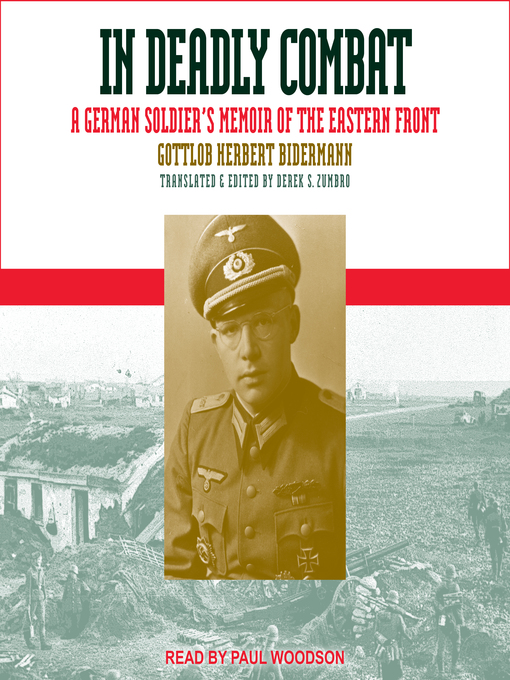In Deadly Combat
A German Soldier's Memoir of the Eastern Front
Bidermann's account debunks the myth of a highly mechanized German army that rolled over weaker opponents with impunity. Despite the vast expanses of territory captured by the Germans during the early months of Operation Barbarossa, the war with Russia remained tenuous and unforgiving. His story commits that living hell to the annals of World War II and broadens our understanding of its most deadly combat zone.
-
Creators
-
Publisher
-
Release date
April 18, 2017 -
Formats
-
OverDrive Listen audiobook
- ISBN: 9781541422841
- File size: 402896 KB
- Duration: 13:59:21
-
-
Languages
- English
-
Reviews
-
Publisher's Weekly
May 1, 2000
Firsthand perspectives of German WWII infantrymen are rare, as respected historian Dennis Showalter (Tannenberg: Clash of Empires) points out in his excellent introduction. Bidermann, who is an 18-year-old private in the 132d Infantry Division at the beginning of this memoir, takes us through the invasion of the Soviet Union in 1941, passage across the Dnieper and southern steppes, battles in the Crimea, engagements in northern Russia and retreat through Riga to the Baltic. He retrospectively reviews historical records and sketches the daily happenings and ambience of his unit in a matter-of-fact and unpretentious--yet invariably proud--tone. The translation is direct and generally graceful, sometimes lyrical. Retired Navy SEAL Zumbro, who has translated German accounts for the Eisenhower Center of the University of New Orleans, has translated and expanded Bidermann's 1964 private German publication, utilizing the same preserved documents and retrospective interviews from other members of the 132d. Before war's end, the unit was cut off in Courland, though Bidermann claims it was "never defeated in open battle." After surrender in 1945, the remnants of the division were held in extended captivity. The Wehrmacht subculture, which Bidermann describes but does not connect back to the Reich's atrocities, was compulsively "professional," with loyalty to fellows its all-consuming central ethic. This ethic seemingly sustained these soldiers through continual dire peril of body and soul. Some did survive. B&W photos. History Book Club selection.
-
Formats
- OverDrive Listen audiobook
Languages
- English
Loading
Why is availability limited?
×Availability can change throughout the month based on the library's budget. You can still place a hold on the title, and your hold will be automatically filled as soon as the title is available again.
The Kindle Book format for this title is not supported on:
×Read-along ebook
×The OverDrive Read format of this ebook has professional narration that plays while you read in your browser. Learn more here.

